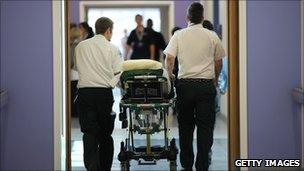Viewpoint: Welsh NHS Confederation on spending review
- Published

The changes will see more patients being treated in their homes, preventing the need to visit hospital
For many people, the hospital building and its rows of beds is the image that sums up everything the NHS does; it is what the NHS is all about.
Many will have seen the coverage of the expected public spending cuts, and will be concerned about what that means for their local NHS services, and their local hospital.
Certainly, there are some tough times ahead. When we look at figures such as £1.3bn - £1.9bn coming out of the Welsh health budget in the next four years, these are ominously large sums of money.
We cannot achieve this level of savings by making small changes here and there.
Hospitals are the most expensive part of our health system, costing thousands of pounds a week to run. It therefore makes sense to look carefully at the role of all of our hospitals, and whether we are using them in the right way.
The main objective for the NHS as it learns to live with less is to keep people out of hospital as much as possible and reduce demand for expensive hospital services.
There are several projects going on across Wales that are doing just that. Teams of specially trained health and social care staff are changing the way they traditionally work.
For example, they visit elderly patients who have had a fall at home, preventing the need to call an ambulance or visit A&E. It means the person maintains independence, and avoids the need for a hospital stay.

Kate Watkins says NHS users need to concentrate on the service rather than bricks and mortar
For the most successful health organisations across the world, the hospital is seen as the last resort. Patients only go into hospital if they have very complex needs that cannot be cared for anywhere else.
This has been our objective for some time - not only can this save money, but it is much better for patients. It is often safer, more user-friendly, more local, and it prevents travel to hospital.
Moving traditional services out of hospital is the biggest change that people can expect to see, and it will certainly mean changing the way we see the role of the hospital.
Bricks and mortar
All too often in Wales we think of the hospital, or the place we deliver care from, as the service. In reality, the NHS is far more than the place where the service is delivered, and we need to change our view so that we concentrate on the service, rather than the bricks and mortar.
At the moment, a lot of what we do in hospital doesn't need to be done there. There are procedures which could safely be done by trained staff in your own home or the GP surgery; such as chemotherapy and treatment of chronic diseases like diabetes and respiratory conditions.
Rehabilitation and follow-up care can also take place closer to home. Advances in technology mean that X-Rays and scans can be e-mailed, while patients can talk to their doctor or nurse via video links, often saving hours of travel.
If you do need to go to hospital, developments such as keyhole surgery mean it is increasingly likely you'll be in for a day, not for a stay.
Patients can return home sooner and recover in the comfort of their own homes, which is reducing pressure on hospital beds, and allowing us to reduce bed numbers where they are no longer needed.
At the same time, it is becoming increasingly clear that for very specialist services, outcomes are better if care is delivered from a smaller number of larger hospitals with a concentration of specialist staff and expertise.
All of this inevitably raises questions about the role and function of some our smaller hospitals. This is a very important message that the NHS is asking the public to understand: the hospital building may close - but the service will continue in a different way or in a different place.
Today's public rightly expect the NHS to continue providing a top quality service. The NHS is still aiming to improve care and services in the next four years, even as we see budgets get smaller.
However, we're asking the public to have an open mind when it comes to how those services will be delivered. There are ways we can do things better, but in a different way.
Nothing stays still in the world of health and science, and the NHS needs to move and modernise with it.
If we are really bold, and really innovative, and work extremely hard over the next four years with our public sector partners and the public, we could create a much better service in four years' time.
It will be a very painful process to go through to get there, but what we will have at the end will be a leaner, more efficient, more effective NHS - delivered much closer to home.
- Published13 September 2010
- Published16 June 2010
- Published17 June 2010